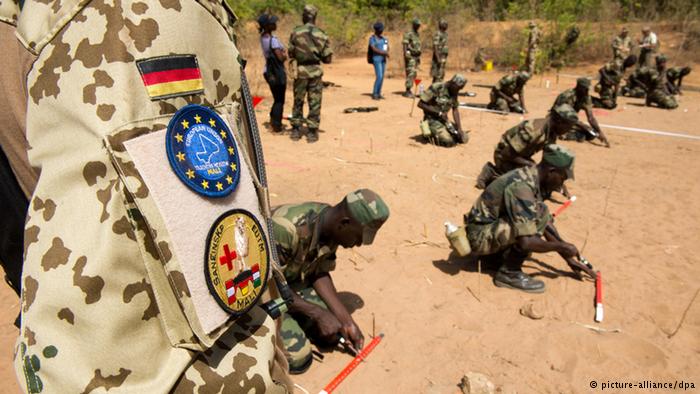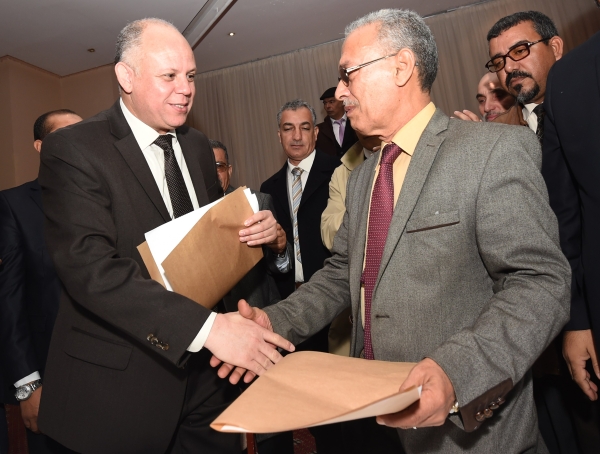By Libya Herald reporter.

Tunis, 1 March 2016:
Berlin and Tunis are looking at the possibility Libyan soldiers and security forces being trained in . . .[restrict]Tunisia by the Germans.
Tunisian Defence Minister Farhat Horchani confirmed that discussions had taken place on the propoal and that he had approved it in principle in an interview with the official Tunisian news agency TAP today.
He said that the proposal came from the Berlin.
“We have been asked by Germany and we have agreed on the principle,” he said.
A German official also told the Libya Herald that his country was ready to train Libyan security forces in Tunisia, and a German delegation had been to Tunis to ask the government to agree to it. But for it to happen it needed a request from the Libyan government – and, at the moment, “there is no government”.
As to who exactly would be trained and in what areas of expertise, that was still “wide open”, the official said. It could the “the presidential guard”, it could be the police. It would all depend on the request from the Libyan authorities.
He added that in the talks with the Tunisian authorities, the latter saw the training as part of its contribution to the reconstruction of Libya but wanted it to be part of an internationally agreed move.
In his interview, Horchani confirmed this.
“We could help the Libyan national union government to extend its authority and train its army and we are ready to support it at the international level,” he said.
Tunisia was, he also reiterated, still firmly opposed to any foreign intervention in Libya.
“It would “complicate the situation and solve nothing. Civilians will once more pay the price,” he said. That, however, did not mean that the country was neutral in fight against terrorism.
“Tunisia which is also facing terrorist threats cannot afford to be neutral,” he specified.
Tunisia did not have an issue with Libyans he said. Many of the terrorists in Libya were Tunisians, he admitted, as well those who had carried out the Bardo and Sousse attacks.
“The fact of the matter is that terrorists are making the most of the [Libyan] state’s weakness and proliferation of arms in Libya,” he said.
German-Tunisian security cooperation vis-à-vis Libya meanwhile saw a separate development today with the arrival at El Aouina barracks in Tunis of vehicles and equipment gifted by Germany to help improve security on the Tunisian-Libyan border.
It consists of 29 off-road vehicles as well as systems to detect of traces of explosives and other equipment.
“This donation reflects Germany’s commitment to increase the operational capacity of Tunisia and support it in the fight against terrorism,” said German Interior Minister Thomas de Maizière, who is visiting Tunis.
Germany could help the Tunisian army in other ways in the campaign to ensure the country’s security and against illegal migration and organised crime, de Maizière added.
“The logistical support Germany has provided to Tunisia in the security field has been of great importance,” he said.
Germany, along with the US, is also providing electronic surveillance equipment for the “fence” stretching along the border, the earthworks for much of which are already complete. Tunisian troops are being trained by the Germans in their use.
In a related development, the British defence minister has announced that the UK is sending a unit of troops to Tunisia to train Tunisian forces on border protection.
“A training team of some 20 troops from the 4th Infantry Brigade is now moving to Tunisia to help to counter illegal cross-border movement from Libya in support of the Tunisian authorities,” minister Michael Fallon told the British parliament yesterday.
The unit has, in fact, already started work, according to a Tunisian defence ministry spokesman today. He said that the first training programme started three weeks ago and that a second would gets under way at the end of March. The UK was already providing training ion military engineering to the Tunisian army, the spokesman added.
Meanwhile, it is reported that three Tunisian women suspected of trying to cross over into Libya to join militants there were arrested at a mosque yesterday in the Tunisian border town of Ben Guerdane. Four others who were believed to be helping them were also arrested. This comes in addition to ten other Tunisians arrested over the weekend attempting to join terrorist forces in Libya.
The President of the Rescue Association for Tunisians Trapped Abroad, (RATTA), Mohamed Iqbel Ben Rejeb, was also quoted by tunisia-live.net saying that the number of those trying to go Libya could be higher than disclosed. The official figure “doesn’t really account for those that go unreported by the families for fear of shame”, he said. [/restrict]








